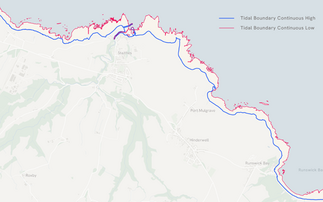The pre-publicity suggests the influential writer's latest book will take aim at the green movement, but is such criticism justified
What follows is adorned with three important caveats. Firstly, I'm a big fan of much of Steven Pinker's work. The Better Angels of Our Nature, the book that painstakingly documented how levels of violence in human society has declined, was a masterful piece of work. In an era where the term 'public intellectual' has been debased by barriers to entry so low anyone with a half novel way of regurgitating the blindingly obvious seems to warrant the moniker, Pinker remains the real deal. Those critics who mistake his data driven assessment of encouraging global trends for an insouciance towards continued injustice do him a grave disservice.
Second, his new book, Enlightenment Now: The Case for Reason, Science, Humanism, and Progress, sounds both fascinating and timely. I couldn't agree more with his central argument that at a time when ideological extremes are on the march a muscular defence of Enlightenment values is essential. His insistence that reason and progress are "under threat from authoritarian populism, religious fundamentalism and radicalism of the left and right" is fully justified. His warning that "the great successes the world has enjoyed over the past decades and centuries are taken for granted, because many of the ideas responsible for them have become part of the establishment and no one is willing to defend them", should be heeded.
Third, I haven't yet read the book. The pram in the hall may or may not be the enemy of good art, but it is definitely the enemy of finding the time to read intellectually stretching, 550 page treatises on the nature of reason. I don't doubt the book is much more comprehensive and nuanced than the arguments expounded in promotional interviews, which by definition are both selectively edited and wilfully sensationalist.
As a result this is categorically not a critique of Enlightenment Now. It is instead a critique of The Observer's interview with Pinker about Enlightenment Now. An interview which appeared yesterday under the headline "Steven Pinker: 'The way to deal with pollution is not to rail against consumption'".
If critiquing a newspaper interview instead of the book itself sounds a little absurd, it is worth remembering how the narratives surrounding a new book are often firmly established well before it is released. It is also worth noting that when the policy makers and opinion formers who would like you to think they have the time to consume 550 page treatises on the nature of reason are actually as busy as the rest of us, promotional interviews play a hugely important role in shaping a book's reach and influence. This is especially true if the ideas being promoted play into an existing and comforting narrative.
All of which is a roundabout way of getting to my central question, which is Steven Pinker, what on Earth are you talking about?
The interview takes as its hook Pinker's response to a question about whether we are becoming mindless consumers, who can only see value in disposable commodities? "The intellectual and cultural critics who make that argument never seem to include trips to the continent or fine food and wine as a sign of soulless materialistic consumption," he responds. "It's always consumption by the other guy that they think of as morally compromising. There's an issue with the effects on the environment: it really is not good to pollute the environment, particularly when it comes to carbon emissions, but the way to deal with that is not to rail against consumption. There are a lot of aspects of consumption, like being able to travel, see the world, be warm in the winter, cool in the summer, that are human goods. The challenge is: how do we get the most human benefit with the least environmental damage?"
Judging by the rest of the profile, this caricature of hypocritical greens and the jovial demolition of environmentalist straw men is expanded upon at length in the book, alongside the absurd assumption that the green movement is somehow unaware of the fact that the key challenge is "how do we get the most human benefit with the least environmental damage?"
"It's likely that Enlightenment Now will prove [Pinker's] most controversial book to date," writes The Observer's Andrew Anthony. "His targets are many and he pulls few punches. For example, he takes the green movement to task for a "misanthropic environmentalism" that views modern humans as "vile despoilers of a pristine planet"."
The profile continues in this vein. "Underpinning the belief that humans are destroying the Earth is the assumption that progress is not sustainable," Anthony writes. "Pinker disagrees, or at least argues that such doomsday conclusions have a long and fallible history."
Maybe the paraphrasing of his argument does Pinker an injustice, but there is a lot that is problematic in this assessment of an anti-development, doomsday-embracing, "misanthropic environmentalism", and not just because he is being rude about a movement of which I count myself a part. If this is indeed an attack on what the article characterises as the "green movement" then it is crucial to accurately define the term.
It is true there is a faction within the environmental movement that resembles Pinker's characterisation, but firstly this deepest of deep green environmentalism is often driven as much by a crushing sadness at the scale of the environmental challenge we face and an understandable scepticism about our ability to overcome it, as it is by any sense of misanthropy. And, more importantly, it is a vanishingly small fringe to the wider environmental movement. In more than a decade covering environmental issues and meeting hundreds of campaigners and environmentalists I can count the number of people who you could reasonably accuse of misanthropy on one hand.
The reality is the modern green movement takes in everyone from a small band of nihilists, through the vast majority of environmentalists who are fully committed to the pursuit of "the most human benefit with the least environmental damage", to thousands of multinational businesses and all but one of the world's governments via the Paris Agreement and their commitment to building a net zero emission economy this century.
This movement is not an opponent of Pinker's argument that economic and technological progress is essential to the delivery of clean energy, but one of its staunchest allies. All around the world, people who would define themselves as environmentalists are developing and deploying the clean technologies and pioneering the green commercial and economic models that will drive this progress.
The article suggests that "Pinker's message is that if we are not going to return to hunter-gathering - and we're not - we had better face up to the task at hand". Fair enough, but it is a message better directed at crank survivalists than the millions of environmentalists who have dedicated their lives and careers to facing up to the task at hand.
The same opaqueness of definition is to be found in Pinker's headline-grabbing insistence we should not "rail against consumption". He is, of course, right in many respects. Attacking any and all consumption is counterproductive and one of the surest ways for environmentalists to alienate audiences and attract accusations of hypocrisy. But what of hyper-consumption that brings with it negligible utility for all concerned? What of consumption shaped by market failures and resource inefficiency? What of the difference between resource consumption and dematerialised consumption built around the sharing economy?
These debates are not only valid, they have provided some of the most profitable avenues explored by environmental campaigners in recent years, as evidenced by the mainstreaming of concerns over plastic pollution and the shifting consumption patterns of millennials.
It would be bad enough if this was just another case of an outdated stereotype being used to smear the one global movement campaigning for a commensurate response to a planetary scale threat - sadly we're all well used to that - but it's worse, much worse.
For example, the interview hints that Pinker's beef with the green movement takes in the old canards relating to nuclear power, shale gas, GM crops, and developing world energy access. "[Tackling environmental challenges] probably means using more nuclear reactors in the immediate future, something that, as with GM crops and shale gas, the green movement has responded to with apocalyptic protestation," Anthony writes. "And we may also have to acknowledge that to cut down on carbon emissions, the developing world first needs to attain a level of material wealth, by burning more energy, at which point it can turn its attention to the environment."
This suggestion that the measure of your grown-up seriousness on climate change is determined by your stance on nuclear, GM, and shale gas is both well past its use-by date and frustratingly reductive.
For a start the "green movement" is divided on nuclear and GM, even if it is more unified in its concerns about shale gas. Some of the world's most influential environmental campaigners believe the scale of the climate emergency necessitates the rapid roll out of all forms of low emission power, including nuclear. Even mainstream green NGOs tend to support research into next generation nuclear technologies that may prove more cost effective and promise to tackle waste issues. Some environmentalists keep an open mind on the potential merits of GM.
Where there is opposition to these technologies it tends to be driven not by the anti-progress mentality that critics ascribe, but a completely justifiable assessment of risks and rewards, costs and benefits. You can disagree with those who want to vigorously apply the precautionary principle to nuclear power and GM crops, but it is unfair to imply that makes them "misanthropic".
Equally, critics of shale gas are not motivated by an antipathy to low cost energy or a misunderstanding of the fact gas is less carbon intensive than coal. They are motivated by fears about methane leaks and the prospect of locking in a new generation of fossil fuel infrastructure at a time when plummeting renewables and energy storage costs look a better bet for complying with an ever dwindling global carbon budget.
As for the suggestion it is better to help poorer nations develop using dirty energy; well, with clean energy costs plummeting even those lentil-wrangling hippies at the World Bank barely buy that argument any more, after pledging to only fund coal or upstream oil and gas projects in the rarest of circumstances.
Pinker's coupling of broad techno-optimism and Enlightenment values will no doubt prove seductive to many, but for me,inadvertently or not, it risks nurturing a certain complacency.
Anthony's assessment is that Pinker believes environmental problems comply with "a fundamental tenet of the Enlightenment… that all problems, if studied long and hard enough, could be understood, and therefore at some point solved". Again, maybe the characterisation is unfair, maybe the book goes into more depth, but the defining characteristic of our best scientific understanding of the climate threat is that we do not necessarily have the time to study the problem long and hard enough, just as we no longer have the luxury of watching all economies develop along a high carbon path.
Even if we were living in an era when Enlightenment values were in complete ascendancy instead of in an era when the official position of the world's most powerful government is full spectrum ideological climate denialism, then we may not have enough time to build the net zero emission economy that would head off dangerous levels of climate change. As President Obama used to say "there is such a thing as being too late on climate change". Yes, we urgently need to apply reason, science, humanism and progress to tackling environmental problems, but we also have to acknowledge that if we do not apply these traits successfully, quickly, and widely enough then there is a not insubstantial risk that the progress we have enjoyed over the past three centuries could be jeopardised.
The risk is that Pinker's arguments, at least as presented this weekend, will only serve as ammunition for those who wish to downplay environmental risks and delay climate action.
Right on cue, one of the first responses to yesterday's article came from the Global Warming Policy Foundation Twitter account. In case you are unaware of the social media output of the UK's foremost 'climate sceptic' 'think tank', I find it helps to interpret it as a purveyor of auto-satirical content that is best understood as a piece of performance art designed to throw a spotlight on the utter credulity of its chosen political tribe.
Anyways, it's assessment of the article was that it constituted a "fair and balanced interview with @sapinker about his new new book, following in the footsteps of @mattwridley; @GeorgeMonbiot and anti-enlightenment dark greens won't like the evidence and arguments. The post-postmodern fightback has begun".
As a take it is doubly laughable. Firstly for suggesting the respective oeuvres of the Johnstone Professor of Psychology at Harvard University and the former Chairman of Northern Rock belong in the same ballpark. And secondly for citing George Monbiot, someone who may well disagree with parts of Pinker's analysis, but who is also one of the most prominent environmental voices calling for the use of nuclear power to curb greenhouse gas emissions.
However, ridiculous as the GWPF's argument may seem, I don't doubt many leading climate sceptics are now busy ordering their copy of Enlightenment Now and revving up their cherry pickers in readiness.
Maybe the book will disappoint them. Maybe it will so comprehensively address the concerns raised above that it will be impossible to misinterpret. But, to adjust the old truism, a promotional interview can travel half way around the world before the book it is promoting has got its boots on.
In the meantime one of the planet's most influential public intellectuals has given valuable airtime to an outdated stereotype of environmentalists that could serve to make the critical expansion and mainstreaming of climate action even harder. It is fair enough to take issue with a small group of fringe deep green environmentalists, although they are a long, long way down the list of challenges our society faces. But characterising the green movement as somehow anti-Enlightenment is both insulting and counterproductive. Not least because for all their flaws, you would be hard pressed to find a more enthusiastic and influential ally in defence of Enlightenment values and the application of a reasoned and rational approach to shared challenges than most modern environmentalists.








